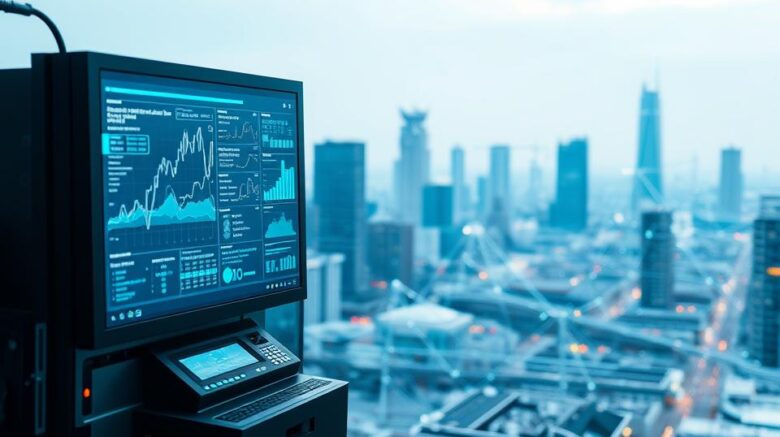Optimizing Protection with Hospital Security Guards
Were you aware that hospitals endure about 30 violent events every day? This alarming figure highlights the essential role of Hospital Security Guards. They protect not just patients but also staff and confidential information. In the rapidly evolving health sector, strong Healthcare Facility Security is paramount. It focuses on forming safe zones where patients obtain services without threats of violence or information breaches.
Partnering with experienced firms like Divine Protection Services enhances Medical Center Security Services. This guarantees that security remains foremost while maintaining accessibility. This write-up delves into how security guard strategies and monitoring setups can substantially bolster security efforts. It covers threats from within and beyond effectively.

Highlight Reel
- Hospital Security Guards play a vital role in protecting patients, staff, and sensitive data.
- Healthcare Facility Security is key to preventing violence and securing privacy.
- Unified security platforms improve the total impact of medical center protection services.
- Collaboration with firms like Divine Protection Services ensures tailored security solutions.
- Cutting-edge technologies underpin contemporary healthcare security strategies.
- Harmonizing accessibility with confidentiality is necessary for successful hospital security practices.
Understanding the Need for Hospital Security
Hospital security is vital for protecting patients, employees, and private information. The increase in aggression within healthcare facilities underscores the necessity for robust Hospital Security Guards. Such officers play a key role in ensuring a safe environment and maintaining the rights and dignity of each individual.
Applying solid Healthcare Facility Security tactics is critical to deter hostile actions. This assists in fostering a caring atmosphere, enhancing the experience for patients and families. It additionally secures conformity with rules such as HIPAA, enforcing secure access to safeguard Protected Health Information (PHI). These actions not only defend patients but also nurture trust between healthcare teams and their communities.
| Security Measure Type | Importance | Regulatory Conformity |
|---|---|---|
| Access Control Systems | Limit unapproved entry and permissions | Vital for meeting HIPAA requirements |
| Surveillance Cameras | Monitor activities and deter criminal behavior | Supports regulatory requirements for safety |
| Emergency Response Plans | Provide quick responses to incidents | Aligned with safety protocols and emergency management standards |
| Training for Security Personnel | Equip staff with skills to handle crises | Ensures compliance with safety standards |
Allocating resources to strong security protocols and personnel training is vital for safeguarding hospitals and health facilities. These procedures create a secure and regulation-adherent space, crucial for providing excellent patient care.
Duties of Hospital Security Guards
Hospital security staff fulfill an essential duty in ensuring the protection of healthcare settings. They monitor access points to stop unauthorized entry, handle emergencies, and use conflict resolution to prevent threats. Equipped by Divine Protection Services training, they identify and address early indicators of agitation or hostility.
Their role is essential in upholding the safety and welfare of patients and personnel. They protect the hospital’s operations, essential for a healing environment. By providing protection, they boost patient satisfaction and decrease threats.
Modern Technologies in Healthcare Security
Current healthcare facilities incorporate Advanced Technologies to enhance security efforts. Medical Center Security Services effectively integrate systems like AI-driven surveillance cameras, which enhance monitoring capabilities. Such cameras provide live tracking and analytics, allowing teams to detect and address risks promptly.
A fundamental part of Healthcare Security Solutions is utilizing access control systems. These systems restrict entry to sensitive areas, ensuring that only authorized personnel can access critical zones. By employing biometric authentication, hospitals can add an extra layer of security to patient information and valuable medical equipment.
AI security solutions play a critical role in physical security. Facial recognition and behavior detection enable security personnel to respond promptly to security breaches. Sophisticated video analysis supports incident-driven decision-making, providing ongoing scrutiny of healthcare settings. This cultivates a secure space for personnel and patients.
| Tech Tool | Use Case | Benefits |
|---|---|---|
| AI-driven Surveillance | Instant observation | Quick risk detection |
| Access Control Systems | Restricted entry | Securing critical zones |
| Facial Recognition | Biometric verification | Blocking illicit entry |
| Video Analytics | Operational oversight | Data-driven decision-making |
Cutting-Edge Technologies shield hospital belongings and foster a safe environment for all. By adopting these state-of-the-art technologies, hospitals can stay watchful for security hazards. This ensures a high standard of care for patients.
Healthcare Facility Security Strategies
Effective Healthcare Facility Security strategies are essential for safeguarding patients, staff, and visitors in medical centers. Performing comprehensive risk evaluations is the foundation of these plans. By recognizing gaps, medical centers can devise customized procedures for different scenarios. This elevates their preparedness for any possible incidents.
It’s essential to urge the reporting of irregular conduct and risks. Healthcare institutions must establish mechanisms to handle those alerts immediately. This proactive stance in Healthcare Facility Security creates a culture where everyone contributes to safety.
Overseeing guest access is a vital part of Medical Center Security Services. Making sure that only permitted persons gain entry preserves a safe setting. Overseeing exchanges between patients and medical staff further reduces threats. This ensures a safer environment for everyone. Presented below is a table detailing the main elements of successful security strategies.
| Security Element | Overview | Benefits |
|---|---|---|
| Risk Assessments | Identifying vulnerabilities and assessing possible threats. | Enhances readiness and reaction speed. |
| Incident Reporting | Encouraging the community to report suspicious activity. | Facilitates timely responses to threats and increases awareness. |
| Visitor Management | Standards for tracking and managing facility entry. | Enhances security and reduces unauthorized access. |
| Staff Training | Offering safety training to staff members. | Empowers staff to handle security incidents effectively. |
Training Security Personnel Effectively
Proper training of hospital security staff is critical for upholding safety in medical centers. Regular instruction assists personnel in coping with evolving risks. It further enhances their capacity to react effectively in varied scenarios.
Divine Protection Services focuses on cultivating robust situational awareness among security teams. This involves acquiring de-escalation abilities for stressful engagements. Ongoing simulations and training exercises solidify guidelines. Personnel gain the ability to handle risks swiftly while maintaining respect and dignity.
This training strategy for security teams extends past basic defense techniques. It fosters a culture of safety and professionalism in healthcare facilities. By emphasizing essential skills, medical centers guarantee their security staff can face threats competently.
Compliance with Regulatory Standards
Conforming to Regulatory Standards is indispensable for healthcare facilities that prioritize safety and trust. HIPAA, in particular, demands secure entry controls to shield Patient Health Information (PHI). Such measures block illicit entry and prevent data breaches.
Hospitals can strengthen their compliance by instituting detailed protocols. These include regular audits, staff training, and clear incident reporting processes. These practices not only safeguard patient health but also cultivate community trust.
Companies like Divine Protection Services offer specialized compliance strategies for healthcare facilities. Their knowledge in Hospital Security Services guarantees that security staff are properly prepared to adhere to regulations.
Dedication to compliance lowers risks and forges reliable patient-provider connections. An anticipatory approach to regulations advantages the whole healthcare framework.
Hospital Security Guards in Action
Hospital Security Officers are vital in keeping healthcare facilities safe. Their work is seen in many real-life situations, showing their proactive approach. In one case, they address altercations in reception areas, promptly de-escalating them to impede violence.
In high-pressure instances, these officers guide individuals to protective zones, assisting them as required. This practice secures those who are vulnerable and upholds a serene atmosphere. Their collaboration with authorities during critical events spotlights the role of Professional Healthcare Security. They often serve as the first line of response.
The training from Divine Protection Services prepares these guards to handle emergencies well. They acquire skills to uphold policies while maintaining respect for all. This blend of authority and compassion turns them into vital components of the healthcare team. They endeavor to maintain safety and security for every person in the facility.
Customizing Security Solutions for Healthcare Facilities
Healthcare institutions confront distinct security hurdles that necessitate a personalized approach. Customizing Security Solutions is key to effectively tackling these issues, ensuring a safe space for both patients and staff. Collaborating with specialists such as Divine Protection Services allows hospitals to develop security plans tailored to their exact requirements.
A holistic security strategy encompasses vital domains like violence avoidance and pharmacy protection. By using advanced technologies, facilities can boost their safety measures while adhering to HIPAA standards. This typically involves visitor screening platforms and adaptable access control systems to suit changing requirements.
The duties of Medical Facility Guards are critical as well. They benefit from targeted training to deal with security episodes and ensure sustained vigilance. Their presence not only discourages threats but also reassures staff and patients.
The table below shows how Customizing Security Solutions addresses various healthcare challenges:
| Challenge | Tailored Approach |
|---|---|
| Violence Prevention | Training for Medical Facility Guards in de-escalation techniques |
| Medication Security | Implementing locked pharmaceutical storage and tracking mechanisms |
| Visitor Management | High-level visitor vetting and credential issuance procedures |
| Access Control | Flexible access control platforms that adapt to operational demands |
By strategic preparation and teaming up with the appropriate entities, hospitals can create a robust security framework. This comes from Personalizing Security Solutions to fit their individual needs. Merging human supervision with tech tools greatly enhances protection, resulting in a safer, more efficient medical environment.
Final Thoughts
Securing the safety and health of patients, personnel, and confidential data is critical in hospitals. Hospital Security Guards today employ cutting-edge technologies and instruction to fight contemporary risks. This development not only defends physical locations but also nurtures trust between patients and healthcare staff.
Customized Healthcare Security Solutions help hospitals stay ahead in the ever-changing security landscape. Working with veteran companies like Divine Protection Services empowers medical facilities to address security issues competently. By combining staff development with leading-edge technology, hospitals can create a secure atmosphere for healing and care.
The healthcare industry encounters mounting threats, making skilled security strategies crucial. Hospitals must adopt these evolving solutions to safeguard their environments and uphold the dignity of their operations.
